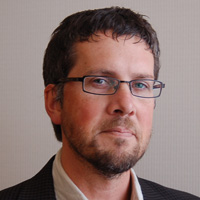If you're like me, that astonishing August eclipse already feels a long time ago. But wasn't that dimming of the morning light one of the bright spots of summer? For over an hour, I joined folks young and old on a plaza to share dark glasses and peer through telescopes, to marvel at the crescent shape projected through a spotting scope onto white card stock, and also a pair of moonshadow googly eyes through binoculars. There were sunspots to be seen and, through a telescope with a hydrogen filter, the arcs of solar flares along the curve of the sun. I went old school: cereal box topped with aluminum foil. A few people asked to see: Does it work?
It was a time of delight and community and wonder, to speak of alignments and cycles, and to marvel at the fact: We are alive to see this!
Then people peeled off to go back to work or class or the morning's errands. I sat in the gardens next to the Mission Church on our campus to do some editing. The noon bells rang for Mass, and that reminded me of how the first time a mission bell rang here more than two centuries ago it forever changed the way time was ordered in this place.
Then I went to get a couple watch batteries changed. Something I'd been putting off for weeks; I never seemed to have time for it. Inside the dusty little clock shop was a solitary bearded man who asked of my trusty Seiko with the brown leather band: Has that been dead long? Apparently the battery in it had started to leak.
On the wall were a few cuckoo clocks and a joke about a newlywed husband who comes home drunk. But that's another story. As for the watch, it has a face that absorbs sunlight and makes the numerals glow in the dark. It must be 25 years old now.
